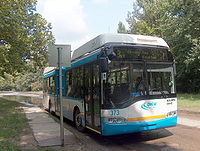- Public transport in Debrecen
-
"DKV" redirects here. For other uses, see Association of Writers of Vojvodina.
Public transport in Debrecen, Hungary, is provided by DKV (short for Debreceni Közlekedési Vállalat – Public Transport Company of Debrecen; complete name is DKV Zrt.)
Before mid-2009 two companies provided public transport in the city: trams and trolleybuses were operated by DKV while buses were operated by Hajdú Volán, which provides transport in the rest of Hajdú-Bihar county. DKV took over bus transport on July 1 after winning a tender. DKV has 140 buses (40 of which are jointed buses). In the future all buses will be low-floor and 50% of them will be air conditioned.
Contents
DKV
The company was founded in 1883 under the name Debrecen Local Tramway Company. They started providing public transport on October 2, 1884 with horse-drawn and steam-powered trams. The first electric tram started operating in 1911. From 1906 the town of Hajdúsámson and later, the town of Nyírbátor were connected to Debrecen by municipal railway, also operated by the same company.
By the 1940s there were already ten tram lines. On June 2, 1944 the city was bombed, and the tramway system was seriously damaged. They were repaired by 1947, and seven tram lines were serving the city until the 1970s, which brought a decrease in the popularity of trams. Tramways were demolished all over the country, the role of trams was taken over by buses. Today Debrecen is one of only four Hungarian cities to have a tram line, but even here only one line survived, the rest were demolished. The importance of DKV decreased, the company lost its leading role in the public transport of Debrecen.
Trolleybuses started operating in 1985, several of them serves on lines which used to be tram lines before the 1970s.
The company became state property on July 15, 1950. Today it is city property.
Trams and trolleys
Between 1970 and 1984 21 FVV trams entered service. The same tram type was used in Budapest, Miskolc and Szeged, trams for the latter two cities were built by DKV. The company still owns eight of them, but they can rarely be seen on the streets.
The typical blue trams (KCSV-1S) of Debrecen were built in 1993. There are only 11 of them in the whole world, all of them in Debrecen.
The company also owns an old nostalgia tram.
The trolleybuses ZiU-9 were manufactured in the Soviet Union, 26 of them entered service since 1985. The four articulated trolleybuses have been in use since 1991. New Solaris Trollino buses are being bought since April 2005, in place of the old Soviet buses. In october 2011 the spanish firm CAF will be in charge of supply of 18 low floor trams to be delivered from 2014.[1]
Buses
Since 2009,the bus lines are also operated by DKV (expect the 3 "CORA" bus lines,that is still operated by Hajdú Volán).Currently,there are over 50 lines (only about 30,when the bus lines with A/Y/I/E or 1 signed bus lines are not counted) and 3 bus types:Volvo Alfa Civis 12,18 and Plasma minibuses (there only 3 from the last type).[2]
Fares
All tickets are valid for all buses, trolleybuses and trams operated by DKV.
Tickets
- Ticket: 270 Ft
- Ticket (when bought on vehicle): 350 Ft
- Ticket for all lines, valid for 1 day: 1100 Ft
- Ticket for all lines, valid for 3 days: 2300 Ft
- Ticket for all lines, valid for 7 days: 3000 Ft
Season tickets (valid for one month)
- Season ticket: 5.890 Ft
- Season ticket for students and pensioners: 2.980 Ft
- Season ticket for persons with small children: 2.970 Ft
Season tickets (other)
- Season ticket for one week: 2.355 Ft
- Season ticket for two weeks: 3.535 Ft
- Season ticket for students & pensioners for 3 months: 8.940 Ft
- Season ticket (with no photo ID, for one month): 17.670 Ft
References
- ^ "Caf wins the contract against Ansaldobreda (In spanish)". http://www.abc.es/agencias/noticia.asp?noticia=957512. Retrieved 11/10/2011.
- ^ "Debreceni Közlekedési vállalat (in hungarian)". http://www.dkv.hu. Retrieved 15/12/2010.
External links
- DKV official site (Hungarian/English)
- Hajdú Volán official site (Hungarian)
- Pictures about public transport in the large hungarian cities
- Tram in Debrecen (English, German)
Public transport in the cities of Hungary Budapest | Debrecen | Miskolc | Szeged | Pécs Categories:- Public transport companies in Hungary
- Debrecen
- Transport in Hungary by city
Wikimedia Foundation. 2010.


